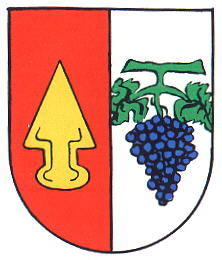Dittwar: Difference between revisions
Knorrepoes (talk | contribs) m (Text replace - "'''Origin/meaning :'''<br/>" to "====Origin/meaning====") |
Knorrepoes (talk | contribs) m (Text replace - "|width="15%"|50 px|right |}" to "|width="15%"|50 px|right |}<seo title="Wappen, Gemeindewappen" />") |
||
| Line 3: | Line 3: | ||
|width="70%" align="center" |'''Heraldry of the World<br/>Civic heraldry of [[Germany]] - [[Deutsche Wappen|Deutsche Wappen (Gemeindewappen/Kreiswappen)]]''' | |width="70%" align="center" |'''Heraldry of the World<br/>Civic heraldry of [[Germany]] - [[Deutsche Wappen|Deutsche Wappen (Gemeindewappen/Kreiswappen)]]''' | ||
|width="15%"|[[File:Germany.jpg|50 px|right]] | |width="15%"|[[File:Germany.jpg|50 px|right]] | ||
|} | |}<seo title="Wappen, Gemeindewappen" /> | ||
Revision as of 17:03, 5 November 2012
| Heraldry of the World Civic heraldry of Germany - Deutsche Wappen (Gemeindewappen/Kreiswappen) |
DITTWAR
State : Baden-Württemberg
District (Kreis) : Main-Tauber Kreis (until 1973 Tauberbischofsheim)
Incorporated into : 1975 Tauberbischofsheim
Official blason :
In gespaltenem Schild vorne in Rot eine gestürzte goldene Pflugschar, hinten in Silber eine blaue Weintraube an einem grünen Stiel mit zwei grünen Blättern.
Origin/meaning
The arms were granted on March 12, 1961.
The arms show a bunch of grapes and a plough iron, both derived from the old seal of the village. The oldest known seal of the village dates from 1768 and shows a crowned wheel, flanked by the grapes and plough. The wheel is the symbol of the State of Mainz, to which the village belonged from medieval times until 1803. In the 19th century the village used a seal with a shield showing only the wheel. As the wheel is very common, it was decided to use the typical village symbols of the 18th century seal in the new arms.
Literature : Zier and Kastner, 1967

